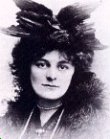
W.B. Yeats was born in Dublin in 1865 into an Anglo-Irish Protestant family. He was educated in London and Dublin and he had a childhood affinity for Co. Sligo where his mother's family had been for four generations. Yeats' father was a painter and both he and his brother Jack received training in art. While Jack went on to become Ireland's greatest ever painter (Jack B. Yeats), William showed a greater interest in poetry and drama.
Yeats is regarded as the greatest poet of the 20th Century mainly on the strength of his work between 1910 -1921. During this period it is fair to say that much of Yeats poetry was dominated by his preoccupation with Maud Gonne, the daughter of a British Army officer, who he had first met in 1883 when she was 19 and he was 23. Maud Gonne's failure to reciprocate Yeats' love was perhaps the single most important inspiration of Yeats' poetry. Maud Gonne's marriage to Major John McBride made Yeats realise that there was no place for him in her life, he then married Georgina Hyde Lees. The marriage was a happy one and they had two children. Yeats' later work is dominated by an element of self criticism that can be seen in "The Circus Animals Desertion". He recognises in his old age that the poetry of his youth was overly embellished with symbolism to the point where the real theme of the poem was often completely cloaked from the reader.